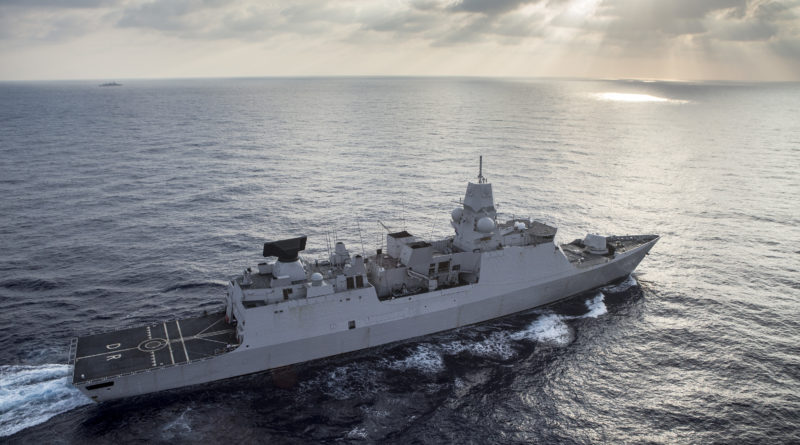The Netherlands confirms its participation in the European operation in the Strait of Hormuz (v2)
(B2) Dutch Prime Minister Mark Rutte confirmed this after the weekly government meeting. The Netherlands will participate in a European surveillance operation in the Strait of Hormuz, for six months

A Dutch command frigate
« The command and air defense frigate Zr. Ms De Ruyter will leave for the Gulf region in January “says the government statement. This confirms our information published a few days ago (read: The operation in the Strait of Hormuz resurfaces. The French at work). It will be equipped with an NH90 transport helicopter – equipped for surveillance such as medical evacuations – and reinforced with additional staff officers on board. The frigate will remain in the area until June, as part of a European maritime mission, set up at the initiative of France. After June, the government does not rule out extending the mission by sending another element (1) .
Surveillance mission in three areas
This mission, called EMASOH (European-Led mission Awareness Strait of Hormuz), will have an essential function of s and will operate at the confluences of Iran. The objective is " to strengthen security " in an area (Strait of Hormuz, Persian Gulf, Gulf of Oman) where " tensions have risen sharply lately we say in The Hague. Read also: details on the European operation.
Vessel traffic: a key Dutch interest
For the Dutch Minister of Defence, this position is in line with the interests of the Netherlands, its shipowners and its economy: “ The Netherlands is a logistics hub and maritime trading nation. [...] Ensuring free and safe passage for maritime traffic in this area is therefore expressly in our interest ”explains Ank Bijleveld-Schouten. Let's not forget, in fact, that one of the world's main oil companies, Shell, is Anglo-Dutch (2).
A withdrawal
This participation implies that the Netherlands will withdraw its maritime contribution to the Standing NATO Maritime Group (SNMG) from February to June, NATO's maritime component of the advanced force (VJTF) in the first half of 2020. Which, for a country as Atlanticist as the Netherlands, testifies to a real commitment and a real feeling of threat, alongside the French.
(Nicolas Gros-Verheyde)
Other operations
Confirmed participation for Sophia
It should be noted that The Hague has also decided to send a ship as part of the European Operation Sophia against trafficking in the Mediterranean (EUNAVFOR Med), if an agreement is reached for the resumption of the naval activity of the operation. The engagement was halted in early 2019 due to a disagreement over the redistribution of captured drowned between EU member states.
... and possible Operation Takuba
The Dutch government is studying also the opportunity and feasibility of participating in a multinational mission in the Sahel", aka theTakuba operation, bringing together European special forces.
- Le Zr. Mrs. De Ruyter must return to her home port Den Helder before the end of June for maintenance operations already scheduled.
- To get an idea of the strategic interest of the Strait of Hormuz: approximately 35% of the oil transported daily by sea passes through it each day, which represents 20% of the world demand for oil (part of the oil being transported by land , pipeline type).
Updated on 30.11 in the morning to integrate the NATO dimension


